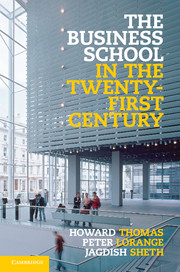Book contents
- Frontmatter
- Contents
- List of figures
- List of tables
- Preface: Tipping or tripping? The business school and its dilemmas
- Acknowledgements
- 1 The business school: history, evolution and the search for legitimacy
- 2 Business school identity and legitimacy: its relationship to the modern university and society
- 3 Rethinking management education and its models: a critical examination of management and management education
- 4 A framework for re-evaluating paradigms of management education
- 5 Evaluating new and innovative models of management education
- 6 Is the business school a professional service firm? Lessons learned
- 7 Enhancing dynamic capabilities in the business school: improving leadership capabilities in curricula and management
- 8 Afterword: business school futures
- Index
Preface: Tipping or tripping? The business school and its dilemmas
Published online by Cambridge University Press: 05 July 2013
- Frontmatter
- Contents
- List of figures
- List of tables
- Preface: Tipping or tripping? The business school and its dilemmas
- Acknowledgements
- 1 The business school: history, evolution and the search for legitimacy
- 2 Business school identity and legitimacy: its relationship to the modern university and society
- 3 Rethinking management education and its models: a critical examination of management and management education
- 4 A framework for re-evaluating paradigms of management education
- 5 Evaluating new and innovative models of management education
- 6 Is the business school a professional service firm? Lessons learned
- 7 Enhancing dynamic capabilities in the business school: improving leadership capabilities in curricula and management
- 8 Afterword: business school futures
- Index
Summary
Even the most cursory perusal of this book will reveal that it deals with an industry that, if not actually in crisis, is certainly suffering from a bad case of existential angst. The industry in question is the education of managers and the subjects are business schools, the main purveyors of management education.
As this book attempts to explain, business schools are in the line of fire of many critics and stakeholders for many reasons. It is an odd position for them to be in. Business schools are in the main fairly august institutions that can trace their origins back a long way (many celebrated their centenary just a few years ago, though with remarkably little external fanfare).
So what are they allegedly doing so wrong? Well, according to their critics, just about everything.
For example, they are said to be far too driven (for an academic institution) by the need and the desire to make a profit. They are accused of pursuing a spurious academic rigour that leads to esoteric research that has little relevance to the real practice of management. Indeed, it is argued that attending a business school programme never actually made anyone a better manager. Some maintain that management is an art and not a science and is not even a profession since it has no widely accepted body of knowledge that has to be mastered, unlike in ‘real’ professions such as accounting, medicine and law.
- Type
- Chapter
- Information
- The Business School in the Twenty-First CenturyEmergent Challenges and New Business Models, pp. viii - ixPublisher: Cambridge University PressPrint publication year: 2013

